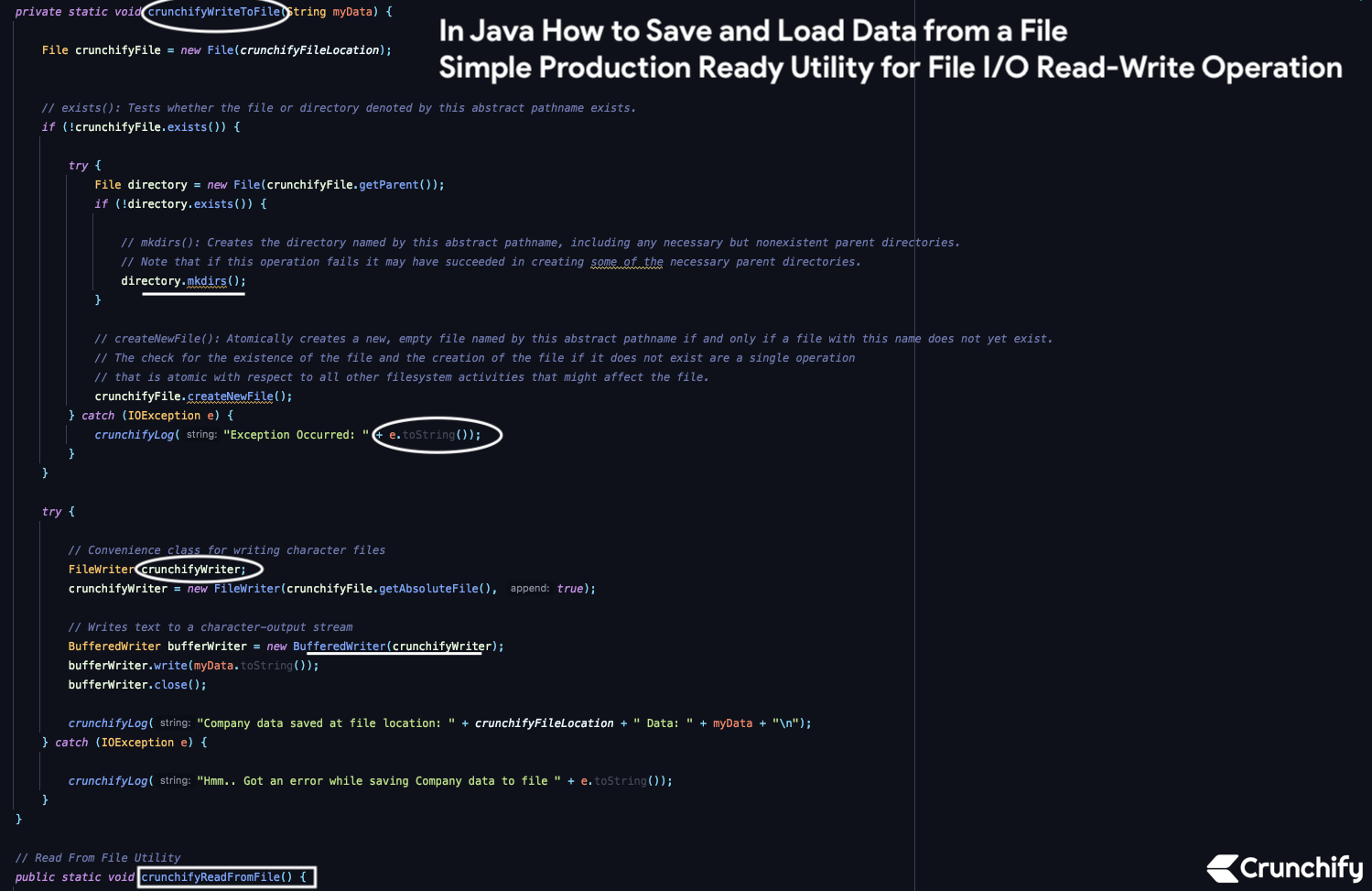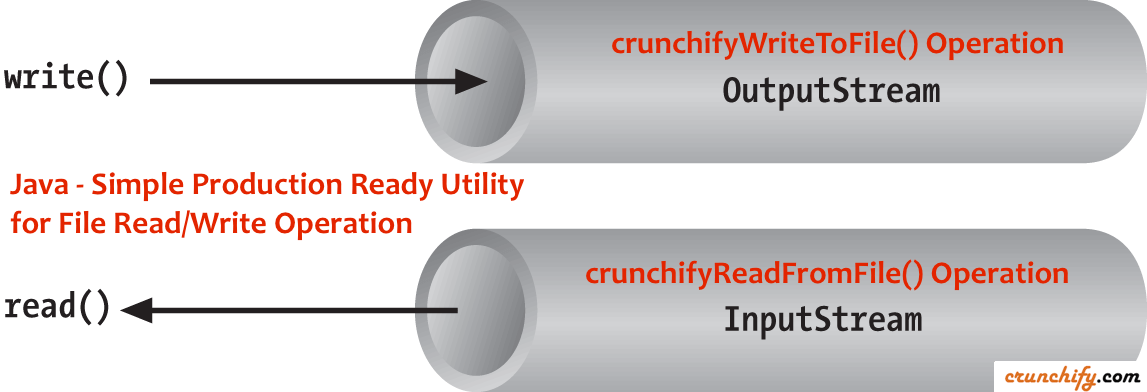En Java Comment enregistrer et charger des données à partir d'un fichier - Utilitaire simple prêt pour la production pour l'opération de lecture-écriture d'E / S de fichier
Publié: 2020-10-11
Comment puis-je écrire un objet dans un fichier et le relire ?
Java est assez étonnant avec beaucoup d'API et avec Java 8, nous sommes entièrement activés avec beaucoup plus d'API comme Lambda, la référence de méthode, les méthodes par défaut, une meilleure interface de type, des annotations répétées, des réflexions de paramètres de méthode et bien plus encore.
Il y a quelque temps, j'ai écrit un article sur Comment lire un objet JSON à partir d'un fichier en Java. C'était une simple opération de lecture Java. Mais dans ce didacticiel, nous allons save and load des données à partir d'un fichier avec un simple utilitaire Java Production Ready.

Nous n'enregistrons pas seulement un objet simple, mais nous allons créer un POJO Java simple de type CrunchifyCompany et allons enregistrer et récupérer l'objet à l'aide GSON . Vous avez besoin de la dépendance ci-dessous pour que le programme ci-dessous s'exécute.
Mettez ci-dessous la dépendance à votre projet maven. Si vous avez Dynamic Web Project et que vous souhaitez le convertir en projet Maven, suivez ces étapes.
|
1 2 3 4 5 |
< dependency > < groupId > com . google . code . gson < / groupId > < artifactId > gson < / artifactId > < version > 2.3 < / version > < / dependency > |
Voici un flux :
- Créer la classe
CrunchifyReadWriteUtilityForFile.java - Créer une classe interne privée
CrunchifyCompanyavec deux champs-
employeesdu privé ; - chaîne privée
companyName;
-
- Créer un objet
crunchifydans la méthode principale - Convertir l'objet en
Gsonpour qu'il soit enregistré dans un fichier - Utilisez la méthode
crunchifyWriteToFilepour enregistrer les données dans un fichier en Java - Utilisez la méthode
crunchifyReadFromFilepour récupérer les données du fichier en Java
Voici un exemple complet :
|
1 2 3 4 5 6 7 8 9 10 11 12 13 14 15 16 17 18 19 20 21 22 23 24 25 26 27 28 29 30 31 32 33 34 35 36 37 38 39 40 41 42 43 44 45 46 47 48 49 50 51 52 53 54 55 56 57 58 59 60 61 62 63 64 65 66 67 68 69 70 71 72 73 74 75 76 77 78 79 80 81 82 83 84 85 86 87 88 89 90 91 92 93 94 95 96 97 98 99 100 101 102 103 104 105 106 107 108 109 110 111 112 113 114 115 116 117 118 119 120 121 122 123 124 125 126 127 128 129 130 131 132 133 134 135 136 137 138 139 |
package crunchify . com . tutorial ; import com . google . gson . Gson ; import com . google . gson . stream . JsonReader ; import java . io . * ; import java . nio . charset . StandardCharsets ; /** * @author Crunchify.com * Best and simple Production ready utility to save/load * (read/write) data from/to file */ public class CrunchifyReadWriteUtilityForFile { private static final String crunchifyFileLocation = "/Users/appshah/Documents/crunchify.txt" ; private static final Gson gson = new Gson ( ) ; // CrunchifyComapny Class with two fields // - Employees // - CompanyName private static class CrunchifyCompany { private int employees ; private String companyName ; public int getEmployees ( ) { return employees ; } public void setEmployees ( int employees ) { this . employees = employees ; } public String getCompanyName ( ) { return companyName ; } public void setCompanyName ( String companyName ) { this . companyName = companyName ; } } // Main Method public static void main ( String [ ] args ) { CrunchifyCompany crunchify = new CrunchifyCompany ( ) ; crunchify . setCompanyName ( "Crunchify.com" ) ; crunchify . setEmployees ( 4 ) ; // Save data to file crunchifyWriteToFile ( gson . toJson ( crunchify ) ) ; // Retrieve data from file crunchifyReadFromFile ( ) ; } // Save to file Utility private static void crunchifyWriteToFile ( String myData ) { File crunchifyFile = new File ( crunchifyFileLocation ) ; // exists(): Tests whether the file or directory denoted by this abstract pathname exists. if ( ! crunchifyFile . exists ( ) ) { try { File directory = new File ( crunchifyFile . getParent ( ) ) ; if ( ! directory . exists ( ) ) { // mkdirs(): Creates the directory named by this abstract pathname, including any necessary but nonexistent parent directories. // Note that if this operation fails it may have succeeded in creating some of the necessary parent directories. directory . mkdirs ( ) ; } // createNewFile(): Atomically creates a new, empty file named by this abstract pathname if and only if a file with this name does not yet exist. // The check for the existence of the file and the creation of the file if it does not exist are a single operation // that is atomic with respect to all other filesystem activities that might affect the file. crunchifyFile . createNewFile ( ) ; } catch ( IOException e ) { crunchifyLog ( "Exception Occurred: " + e . toString ( ) ) ; } } try { // Convenience class for writing character files FileWriter crunchifyWriter ; crunchifyWriter = new FileWriter ( crunchifyFile . getAbsoluteFile ( ) , true ) ; // Writes text to a character-output stream BufferedWriter bufferWriter = new BufferedWriter ( crunchifyWriter ) ; bufferWriter . write ( myData . toString ( ) ) ; bufferWriter . close ( ) ; crunchifyLog ( "Company data saved at file location: " + crunchifyFileLocation + " Data: " + myData + "\n" ) ; } catch ( IOException e ) { crunchifyLog ( "Hmm.. Got an error while saving Company data to file " + e . toString ( ) ) ; } } // Read From File Utility public static void crunchifyReadFromFile ( ) { // File: An abstract representation of file and directory pathnames. // User interfaces and operating systems use system-dependent pathname strings to name files and directories. File crunchifyFile = new File ( crunchifyFileLocation ) ; if ( ! crunchifyFile . exists ( ) ) crunchifyLog ( "File doesn't exist" ) ; InputStreamReader isReader ; try { isReader = new InputStreamReader ( new FileInputStream ( crunchifyFile ) , StandardCharsets . UTF_8 ) ; JsonReader myReader = new JsonReader ( isReader ) ; CrunchifyCompany company = gson . fromJson ( myReader , CrunchifyCompany . class ) ; crunchifyLog ( "Company Name: " + company . getCompanyName ( ) ) ; int employee = company . getEmployees ( ) ; crunchifyLog ( "# of Employees: " + Integer . toString ( employee ) ) ; } catch ( Exception e ) { crunchifyLog ( "error load cache from file " + e . toString ( ) ) ; } crunchifyLog ( "\nCompany Data loaded successfully from file " + crunchifyFileLocation ) ; } private static void crunchifyLog ( String string ) { System . out . println ( string ) ; } } |
Sortie de la console Eclipse :
|
1 2 3 4 5 6 |
Company data saved at file location : / Users / appshah / Documents / crunchify . txt Data : { "employees" : 4 , "companyName" : "Crunchify.com" } Company Name : Crunchify . com # of Employees: 4 Company Data loaded successfully from file / Users / appshah / Documents / crunchify . txt |
Voici le contenu d'un fichier crunchify.txt.
Comme j'ai exécuté le programme two times vous voyez ici JSONObject deux fois car nous ajoutons une valeur au fichier crunchify.txt .


